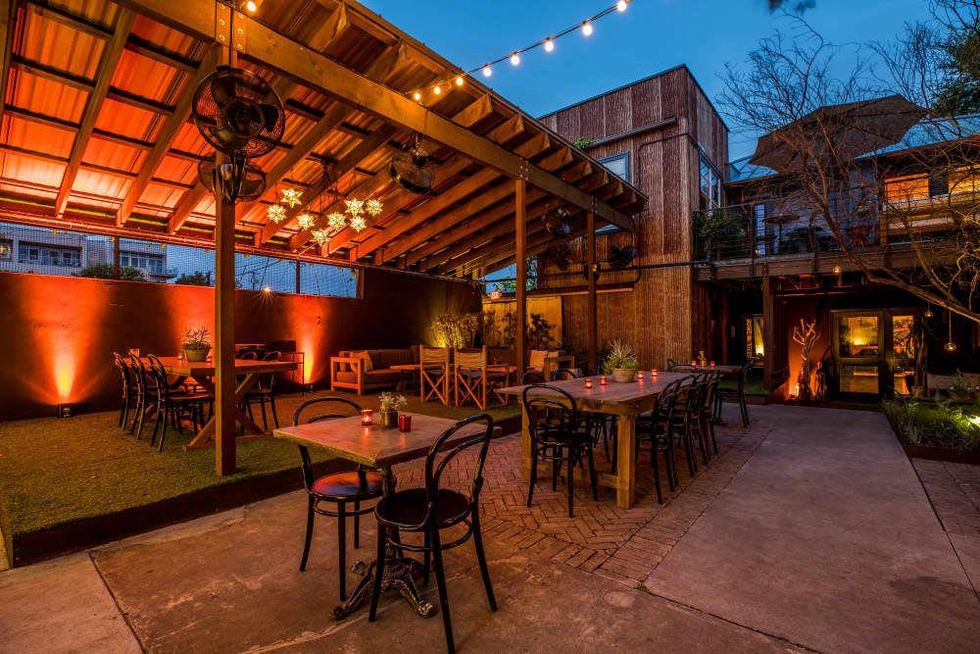Full house, fuller
East Austin’s semi-secret social club slated for host of elegant upgrades

On the corner of Fifth and Pedernales streets sits an industrial-looking venue closed to passers-by but gently buzzing with members. The Pershing House — one of the first two-story structures of East Austin in the 1940s and the former site of the Austin Lumber Company mill until its renovation in 2013 — is now a home away from home for the busy people who frequent it.
The social club, now encompassing three floors, hosts members in a cozy bar, unique meeting rooms, a courtyard, and an event hall in a converted shed. In 2022, The Pershing is breaking ground on additions — including an extremely chic pool area — that will deepen its mission as an effortless place to be at any hour.
“I can candidly tell you that I spend more time here than I do in my own home,” says Pershing manager Kyle Lauterbach.
For Lauterbach, this is not a comment about free time, but a declaration of love for the venue. He points out that members stay hours longer than they even realized, sometimes prompting a nudge from staff to put down their work and close out the day with a drink and good company.
The venue will build a pool area with a 60-foot bar, cabanas, a sauna, steam rooms, and co-ed bathrooms. A coworking space will overlook the pool, and new conference rooms and a green space for phone calls augment the daytime possibilities. Plus, with new overnight casitas, there’s no reason to leave at all. There is already a kitchen in the house, but the site renovations include adding a commercial kitchen that can serve 350 guests.
Founder Kip McClanahan is taking the lead on renovations, utilizing the talents of Daniel Woodroffe at Austin’s dwg. and Burton Baldridge of Baldridge Architects.
The current Pershing House features exposed wood beams reclaimed from the original site, even including some drawings the previous owner’s son had created 40 years prior. Its interior is covered with visual textures, such as stripes, copious tiles, and fabric prints, softened up with more tactile ones, including velvet, hammered brass, and tufted leather. Not much in the house matches, technically speaking.
Walking in feels like a voyeuristic discovery, entering a quirky, affluent stranger’s house and not worrying about overstaying your welcome. Especially the windowless shisha den on the top floor, which takes the tented shape of an attic and can be accessed only by ladder, evokes memories of childhood forts and your artsy college neighbor’s tiny bedroom. The bar, too, is dimly lit and stuffed with seating, perfect for melting into plush corners and hushed conversation. The courtyard is busier, less heady, and more identifiably Austin, with guests wandering about and enjoying the warm air.
Although Pershing only fully closed for two days during the pandemic, the venue cut back on its music programming. It updated its HVAC system, installed UVC lighting, and more, and started delivering meals and drinks. Guests could stop by for COVID-19 testing and enjoy chips and piña coladas while waiting.
Live performances are coming back, bolstered by a partnership with Black Fret, another member-based organization that funds artist grants and performance fees. Every other Saturday, Black Fret sends a handful of local artists for 30-minute sets played at dinner.
Lauterbach gives a rundown of the past week’s events: a musical conversation series hosted by Jason Robert Blum called Songwriter Supper Club, a comedy series hosted by Dan Pyatetsky called One Love Comedy, a jungle vibes DJ set, and Sunday brunch with Mac Mcintosh and the Michael Hale Trio.
This illustrates how the social club offers plenty of events to simply be present in, or to start a conversation with the member next to you.
Lauterbach also points out that even though Pershing is members-only, it’s not as exclusive as some people think. The policy is in place to maintain a safe and genuine community, and guests are welcome. In fact, referrals are the preferred path to membership, as they create a natural social group full of people who already know and like each other. Still, anyone interested who hasn’t secured an invite is encouraged to submit a message on the website. Members are also invited to an international group of private “reciprocal clubs,” so even in a brand-new city, there are friendly communities with similar values expecting visitors.
“We get to get down to the basics of what a bar used to be,” Lauterbach says. “You got to talk about your day and learn something about someone that you didn’t know before, and maybe make a friendship for life. Or even just for the evening.”



